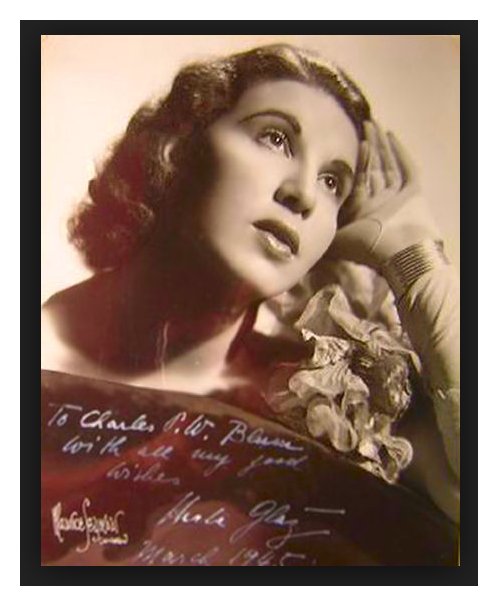

| Born in Austria on September 16,
1910, Herta Glaz received her musical training at the State Academy of Music.
She later studied at the Mozarteum in Salzburg. She made her opera debut at
19 at the State Opera of Breslau as Erda in Wagner's "Das Rheingold." She
then toured Austria and Scandinavia as a concert singer. In 1935-1936 she
sang at the German Theater in Prague. In 1936 she made North America tour
with the Salzburg Opera Guild. While there, the national socialists marched
into Austria and she could no longer return home, and remained in the USA. She made her American debut in Los Angeles in 1936, singing Mahler's "Das Lied von der Erde" and Bach's "St. John Passion," with Otto Klemperer and the Los Angeles Philharmonic, and gave concerts in Paris. In 1939 and from 1944 to 1951 she could be heard at the Opera of San Francisco in numerous roles. From 1938 to 1942 she sang at the Opera of Chicago. She made her Metropolitan Opera debut on Christmas Day 1942, singing the role of Amneris in Verdi's "Aïda." She sang over 300 performances of 25 roles in 14 seasons with the Met. Glaz became an American citizen in 1943 and retired from performing in 1956. She taught at the Manhattan School of Music and the Aspen Music Festival. After moving to Los Angeles with her third husband in 1977, she became an adjunct professor of voice at USC. Glaz was married three times: to the conductor Joseph Rosenstock, to Viennese composer Paul August Csonka, and to Frederick Redlich, former Viennese psychiatrist and later Dean of the Yale University School of Medicine, who was her husband of nearly fifty years. Ms. Glaz died on January 28, 2006, and is survived by a stepson, Peter Chester, and a grandson. |
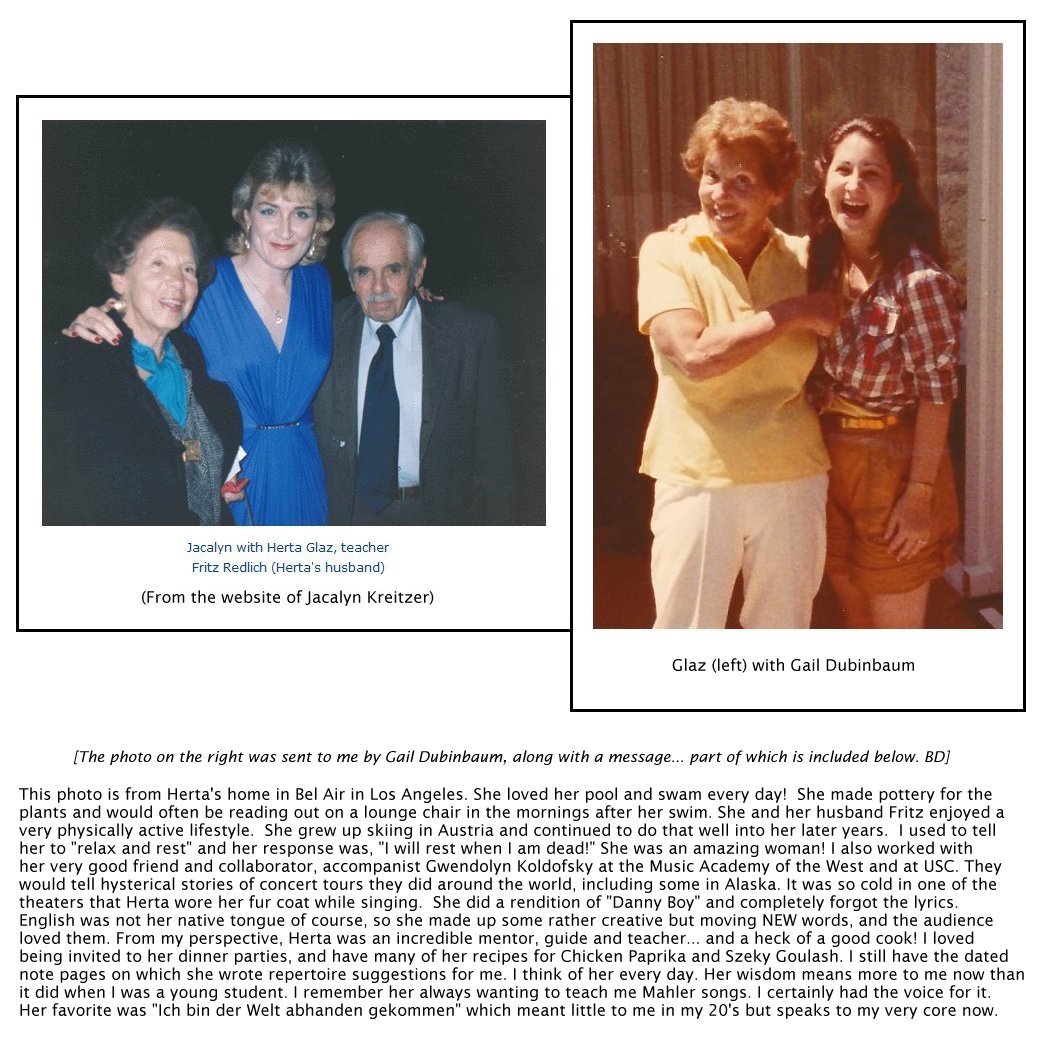
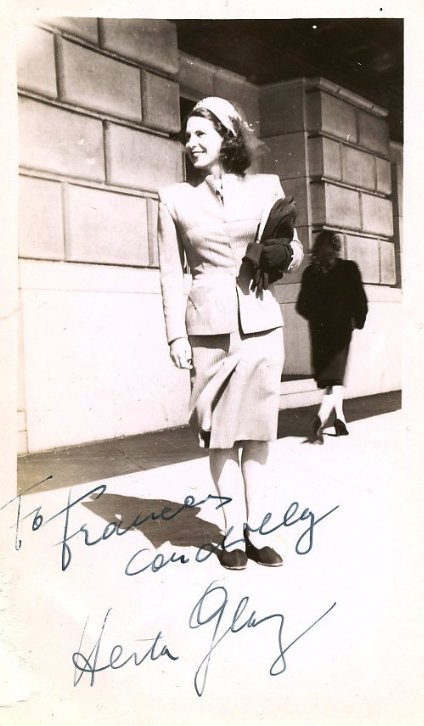 BD: Let me ask a balance question. In opera,
where is the balance between the music and the drama?
BD: Let me ask a balance question. In opera,
where is the balance between the music and the drama?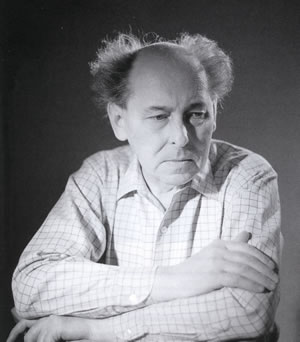 Hans Erich Apostel (Born January 22, 1901 in Karlsruhe – died November 30,
1972 in Vienna) was a German-born Austrian composer of classical music.
Hans Erich Apostel (Born January 22, 1901 in Karlsruhe – died November 30,
1972 in Vienna) was a German-born Austrian composer of classical music.From 1916 to 1919 he studied piano, conducting and music theory in Karlsruhe with Alfred Lorenz. In 1920 he was Kapellmeister and Répétiteur at the Badischen Landestheater in Karlsruhe. He studied in Vienna with Arnold Schoenberg from 1921–1925, and from 1925–35 with Alban Berg, two prominent members of the Second Viennese School. At the same time, he taught piano, composition and music theory privately. Some of his compositions demonstrate his particular affinity with expressionist painting—he was friends with Emil Nolde, Oskar Kokoschka and Alfred Kubin. During the Nazi period his music was proscribed as "degenerate", but he continued to live in Vienna until his death in 1972. Apostel was active as a pianist, accompanist, and conductor of contemporary music in Austria, Germany, Switzerland and Italy. After the war, he was prominent in the Austrian branch of the Gesellschaft für Neue Musik, of which he was president from 1947 to 1950. He was an editor for the Universal Edition, and was responsible for new editions of the operas of Alban Berg, Wozzeck (published in 1955) and Lulu (published in 1963). Although he won numerous prizes for his compositions (including the Austrian State Prize in 1957), his works were rarely performed. He is buried in the Zentralfriedhof in Vienna, Group 32C, No. 57. |
Luigi Dallapiccola (February 3,
1904 – February 19, 1975) was an Italian composer known for his lyrical twelve-tone
compositions. He was born at Pisino d'Istria (currently Pazin, Croatia),
to Italian parents.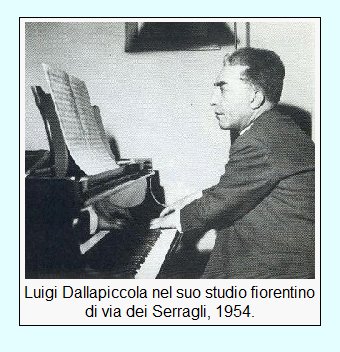 Unlike many composers born into highly musical environments, his early musical
career was irregular at best. Political disputes over his birthplace of Istria,
then part of the Austrian empire, led to instability and frequent moves. His
father was headmaster of an Italian-language school – the only one in the
city – which was shut down at the start of World War I. The family, considered
politically subversive, was placed in internment at Graz, Austria, where
the budding composer did not even have access to a piano, though he did attend
performances at the local opera house, which cemented his desire to pursue
composition as a career. Once back to his hometown Pisino after the war, he
travelled frequently.
Unlike many composers born into highly musical environments, his early musical
career was irregular at best. Political disputes over his birthplace of Istria,
then part of the Austrian empire, led to instability and frequent moves. His
father was headmaster of an Italian-language school – the only one in the
city – which was shut down at the start of World War I. The family, considered
politically subversive, was placed in internment at Graz, Austria, where
the budding composer did not even have access to a piano, though he did attend
performances at the local opera house, which cemented his desire to pursue
composition as a career. Once back to his hometown Pisino after the war, he
travelled frequently.Dallapiccola took his piano degree at the Florence Conservatory in the 1920s and became professor there in 1931; until his 1967 retirement he spent his career there teaching lessons in piano as a secondary instrument. He also studied composition with Vito Frazzi at the Conservatorio Luigi Cherubini. Dallapiccola's students include Abraham Zalman Walker, Luciano Berio, Bernard Rands, Donald Martino, Halim El-Dabh, Ernesto Rubin de Cervin, Arlene Zallman, Roland Trogan, Noel Da Costa, and Raymond Wilding-White. Dallapiccola's early experiences under the fascist regime of Benito Mussolini, who governed Italy from October 1922 to July 1943, colored his outlook and output for the rest of his life. He once supported Mussolini, believing the propaganda, and it was not until the 1930s that he became passionate about his political views, in protest to the Abyssinian campaign and Italy's involvement in the Spanish Civil War. Mussolini's sympathy with Adolf Hitler's views on race, which threatened Dallapiccola's Jewish wife Laura Luzzatto, only hardened his stance. Canti di prigionia and Il prigioniero are reflections of this impassioned concern; the former was his first true protest work. During World War II he was in the dangerous position of opposing the Nazis; though he tried to go about his career as usual, and did, to a limited extent. On two occasions he was forced to go into hiding for several months. Dallapiccola continued his touring as a recitalist – but only in countries not occupied by the Nazis. Though it was only after the war that his compositions made it into the public eye (with his opera Il prigioniero sparking his fame), it was then that his life became relatively quiet. He made frequent travels to the United States, including appearances at Tanglewood in the summers of 1951 and 1952 and several semesters of teaching courses in composition at Queens College, New York beginning in 1956. He was a sought-after lecturer throughout Western Europe and the Americas. Dallapiccola's 1968 opera Ulisse would be the peak of his career, after which his compositional output was sparse; his later years were largely spent writing essays rather than music. He had no more finished compositions after 1972 due to his failing health, and he died in Florence in 1975 of edema of the lungs. There are, however, a very few sketches and fragments of work from this period, including a vocal work left unfinished just hours before his death. It was Richard Wagner's music that inspired Dallapiccola to start composing in earnest, and Claude Debussy's that caused him to stop: hearing Der fliegende Holländer while exiled to Austria convinced the young man that composition was his calling, but after first hearing Debussy in 1921, at age 17, he stopped composing for three years in order to give this important influence time to sink in. The neoclassical works of Ferruccio Busoni would figure prominently in his later work, but his biggest influence would be the ideas of the Second Viennese School, which he encountered in the 1930s, particularly Alban Berg and Anton Webern. Dallapiccola's works of the 1920s (the period of his adherence to fascism) have been withdrawn, with the instruction that they never be performed, though they still exist under controlled access for study. 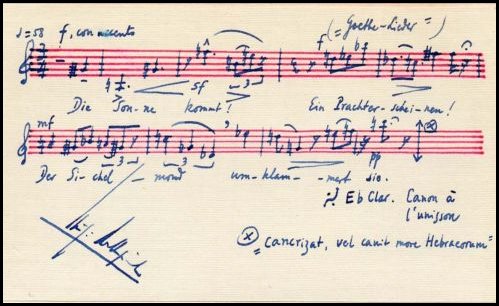 His works widely use the serialism developed and embraced by his idols;
he was, in fact, the first Italian to write in the method, and the primary
proponent of it in Italy, and he developed serialist techniques to allow
for a more lyrical, tonal style. Throughout the 1930s his style developed
from a diatonic style with bursts of chromaticism to a consciously serialist
outlook. He went from using twelve-tone rows for melodic material to structuring
his works entirely serially. With the adoption of serialism he never lost
the feel for melodic line that many of the detractors of the Second Viennese
School claimed to be absent in modern dodecaphonic music. His disillusionment
with Mussolini's regime effected a change in his style: after the Abyssinian
campaign he claimed that his writing would no longer ever be light and carefree
as it once was. While there are later exceptions, particularly the Piccolo concerto per Muriel Couvreux,
this is largely the case.
His works widely use the serialism developed and embraced by his idols;
he was, in fact, the first Italian to write in the method, and the primary
proponent of it in Italy, and he developed serialist techniques to allow
for a more lyrical, tonal style. Throughout the 1930s his style developed
from a diatonic style with bursts of chromaticism to a consciously serialist
outlook. He went from using twelve-tone rows for melodic material to structuring
his works entirely serially. With the adoption of serialism he never lost
the feel for melodic line that many of the detractors of the Second Viennese
School claimed to be absent in modern dodecaphonic music. His disillusionment
with Mussolini's regime effected a change in his style: after the Abyssinian
campaign he claimed that his writing would no longer ever be light and carefree
as it once was. While there are later exceptions, particularly the Piccolo concerto per Muriel Couvreux,
this is largely the case.Liriche Greche (1942–45), for solo voice with instruments, would be his first work composed entirely in this twelve-tone style, composed concurrently with his last original purely diatonic work, the ballet Marsia (1943). The following decade showed a refinement in his technique and the increasing influence of Webern's work. After this, from the 1950s on, the refined, contemplative style he developed would characterize his output, in contrast to the more raw and passionate works of his youth. Most of his works would be songs for solo voice and instrumental accompaniment. His touch with instrumentation is noted for its impressionistic sensuality and soft textures, heavy on sustained notes by woodwinds and strings (particularly middle-range instruments, such as the clarinet and viola). [Autograph shown is from the Goethe-Lieder (1953), for mezzo soprano, piccolo clarinet, clarinet, and bass clarinet.] The politically charged Canti di prigionia for chorus and ensemble was the beginning of a loose triptych on the highly personal themes of imprisonment and injustice; the one-act opera Il prigioniero and the cantata Canti di liberazione completed the trilogy. Of these, Il prigioniero (1944–48) has become Dallapiccola's best-known work. It tells the chilling story of a political prisoner whose jailor, in an apparent gesture of fraternity, allows him to escape from his cell. At the moment of his freedom, however, he finds he has been the victim of a cruel practical joke as he runs straight into the arms of the Grand Inquisitor, who smilingly leads him off to the stake at which he is to be burned alive. The opera's pessimistic outlook reflects Dallapiccola's complete disillusionment with fascism (which he had naïvely supported when Mussolini first came to power) and the music contained therein is both beautifully realized and supremely disquieting. His final opera Ulisse, with his own libretto after The Odyssey, was the culmination of his life's work. It was composed over 8 years, including and developing themes from his earlier works, and was his last large-scale composition. |
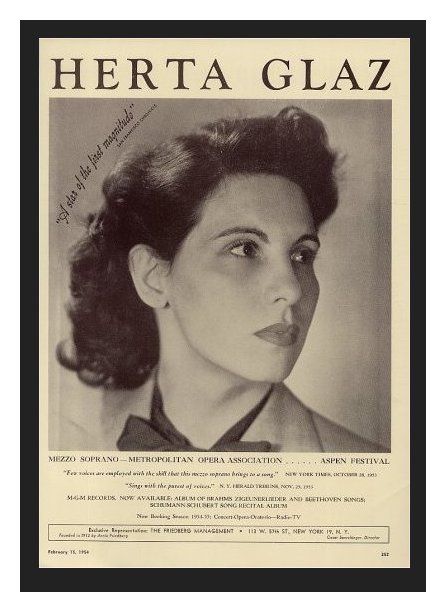 BD: You also sang Erda?
BD: You also sang Erda?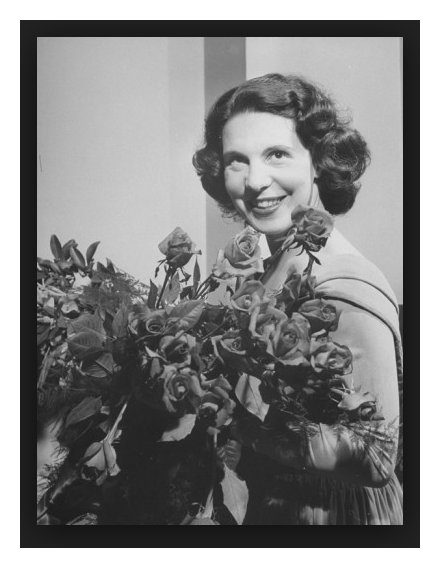 HG: When I was from my fourth to my thirteenth
year, I wanted to be an actress. So anything which created a challenge
to be like a chameleon, to change my colors, intrigued me. I also would
like to say something to the young people. I never thought that there
are small roles. I thought that every role, if properly done, is important
and essential to the opera. For instance, I went to a famous performance
of Fidelio a few years ago, which
was excellent, except that one singer who came out as a prisoner had one
large sentence to sing, and it was god-awful. It spoiled the whole
evening for me. People should not think they should sing only the major
roles.
HG: When I was from my fourth to my thirteenth
year, I wanted to be an actress. So anything which created a challenge
to be like a chameleon, to change my colors, intrigued me. I also would
like to say something to the young people. I never thought that there
are small roles. I thought that every role, if properly done, is important
and essential to the opera. For instance, I went to a famous performance
of Fidelio a few years ago, which
was excellent, except that one singer who came out as a prisoner had one
large sentence to sing, and it was god-awful. It spoiled the whole
evening for me. People should not think they should sing only the major
roles.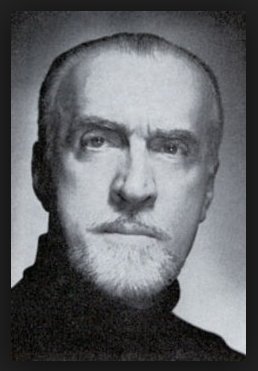
Alberto Erede (8 November 1909 – 12 April 2001) was an Italian conductor, particularly associated with operatic work. Born in Genoa, Erede studied there before studying in Milan, then with Felix Weingartner at Basle, and after this with Fritz Busch at Dresden. He made his debut in Turin in 1935, conducting Der Ring des Nibelungen. He also conducted at the Salzburg Festival. Fritz Busch invited him to Glyndebourne in England, where he conducted several performances before the war. He went back to England after the war, in 1946, to become music director of the New London Opera Company. From 1950 to 1955 he conducted at the Metropolitan Opera House, New York. From 1956 he was at the Deutsche Oper am Rhein and was the musical director there from 1958 to 1962. He conducted Wagner's Lohengrin at Bayreuth in 1968, being the first Italian to appear there since Arturo Toscanini. In 1985 he made guest appearances in Sydney with the Australian Opera. Erede conducted the earlier series of Italian opera on long-playing Decca Records featuring Renata Tebaldi and the Accademia di Santa Cecilia (Rome) Orchestra and Chorus, during the 1950s. |
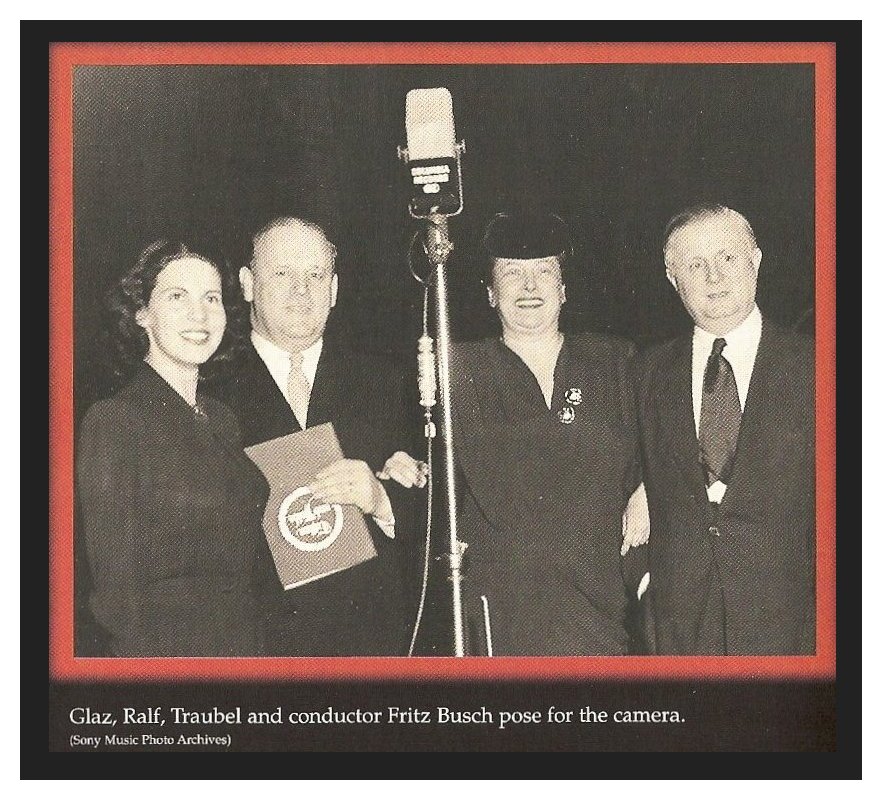
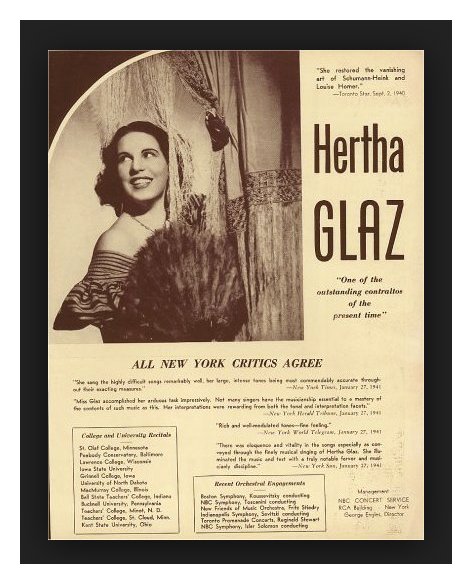 BD: Does she really believe that she is doing the
right thing in making the substitution?
BD: Does she really believe that she is doing the
right thing in making the substitution?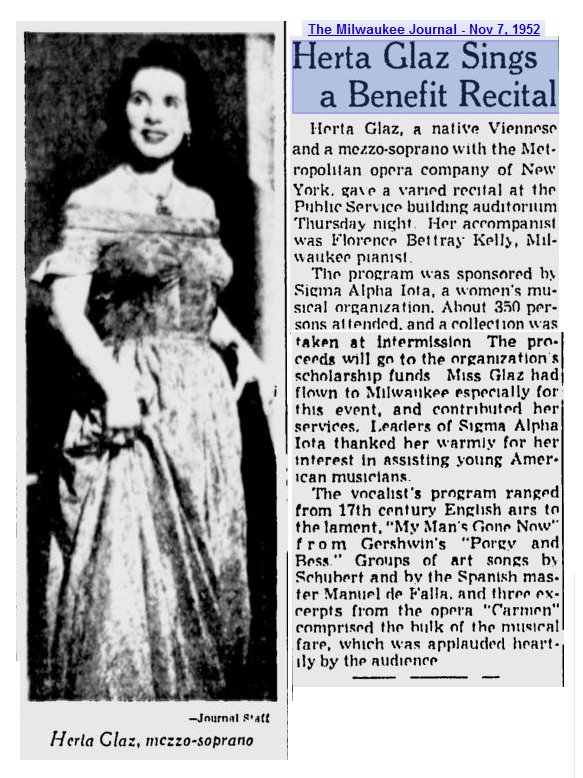 BD: And that’s what you encourage you students
to do now?
BD: And that’s what you encourage you students
to do now?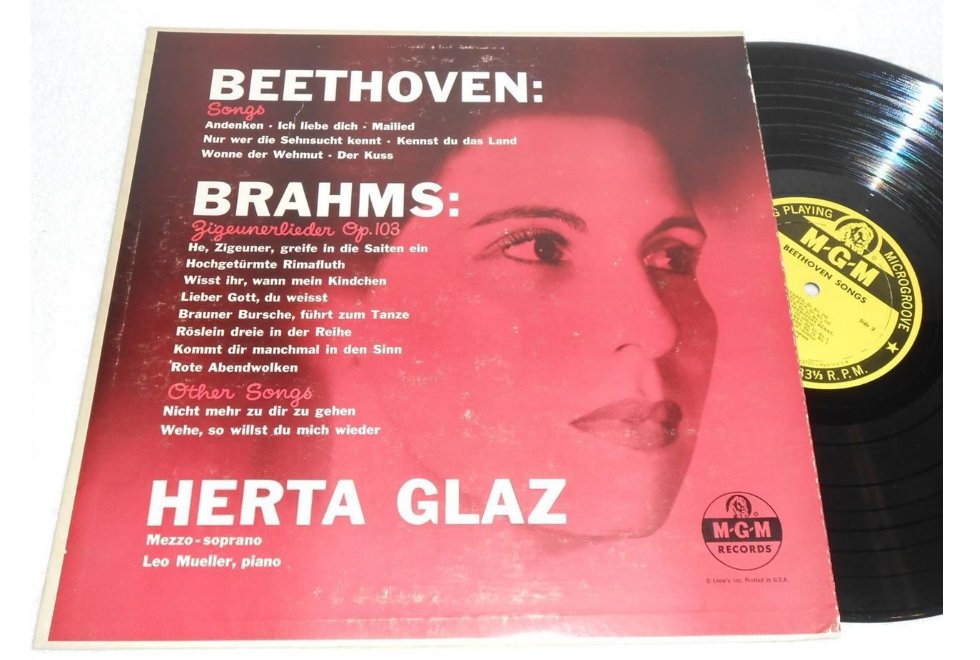
This interview was recorded on the telephone on February 7, 1988.
Segments were used (with recordings) on WNIB later that year, and again in
1993 and 1998. A copy was also provided for use by Schoemaker's Opera
Group in New York City. The transcription was made and posted on this
website in 2013.
To see a full list (with links) of interviews which have been transcribed and posted on this website, click here.
Award - winning broadcaster Bruce Duffie was with WNIB, Classical 97 in Chicago from 1975 until its final moment as a classical station in February of 2001. His interviews have also appeared in various magazines and journals since 1980, and he now continues his broadcast series on WNUR-FM, as well as on Contemporary Classical Internet Radio.
You are invited to visit his website for more information about his work, including selected transcripts of other interviews, plus a full list of his guests. He would also like to call your attention to the photos and information about his grandfather, who was a pioneer in the automotive field more than a century ago. You may also send him E-Mail with comments, questions and suggestions.